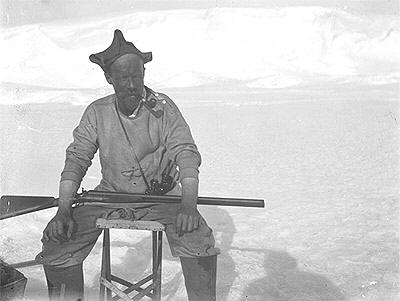Without the sea anchor, the boat began to rock violently. Miraculously, the crew was able to keep the
Caird from capsizing. Worsley took a reading immediately after the sun came out, and he found that they were 403 miles from Elephant Island which put them about half way to South Georgia. The sun stayed out for the next day and they were able to dry them selves to a certain degree. Worsley took his reading the next day, and to their amazement, they had traveled 52 miles in twenty-four hours. One night during Shackleton's watch, he spotted a light in the distance, but it actually turned out to be a massive wave. "And then it hit--and she was caught in a mountain of seething water and catapulted bodily forward and sideways at the same time." Those who were sleeping were easily awoken, and the men scurried about bailing the water from the deck. Again by the grace of God, they were able to keep the boat afloat and the water had returned to an acceptable level.
After traveling for thirteen days, they were only a mere 91 miles from the closest point of South Georgia. Water now became a concern for the crew. The last cask of water was tainted from when it fell out of the boat in their rugged launch form Elephant Island. It had been cracked which drained some of the fresh water and allowed some salt water to seep in. The crew anxiously awaited any sign of land. Their anxiety was partially due to their extreme thirst. When they were within ten miles of the shore, McCarthy spotted land.
 |
| King Haakon Bay |
The land they had spotted was Cape Demidov, but soon they would realize that this was merely a tease because Cape Demidov is surrounded by reefs which made landing highly improbable. They then decided to make for King Haakon Bay which lay another ten miles away. The weather was unfavorable during this time. They were barely making any headway at times. While battling the weather, Annenkov Island, another island that was surrounded by reefs, caused the current to pull the boat towards its treacherous waters. Another stroke of luck, or maybe just sheer will, helped them to avoid this disaster that many thought would cause their demise. At four o'clock, Shackleton spotted a way to enter King Haakon Bay. He knew they would have to make it there before nightfall in two hours. At five o'clock, Shackleton guided the crew into a cavern where the landed. Within moments of landing, they were drinking all the water they could from a nearby fresh water stream. As I read this passage, I found that I had actually been holding breath until I finished reading the chapter. The crew's moment of landing on South Georgia is what I believe to be the
climax. This part of the story seems to be of the most importance although many other very important moments have already occurred in the story.










